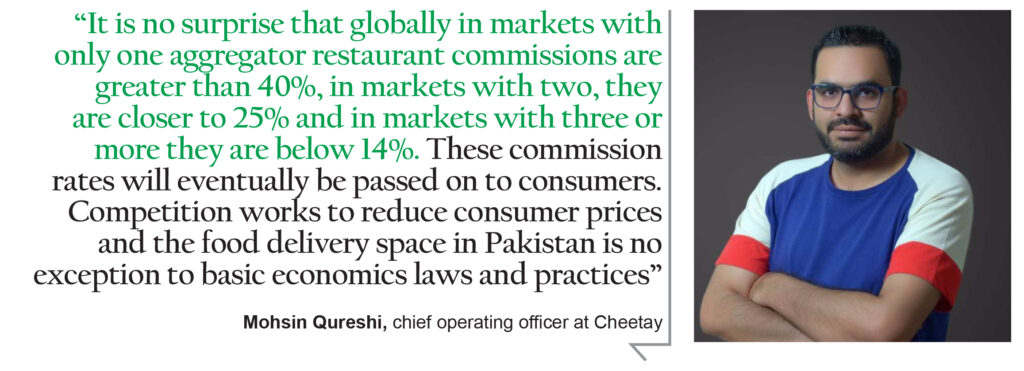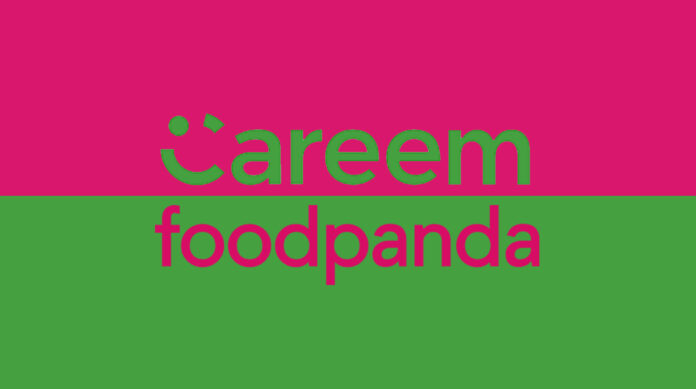There is no sugarcoating the fact that the food delivery business is tough, not just in Pakistan but fundamentally every single country in the world. From managing cash burn to marketing to timely deliveries, food delivery is a thorny nut to crack, and one that bleeds money from the business. And yet a number of competitors launch themselves in this market on a global level, and some of those players are also competing in Pakistan. And in the Pakistani market, it looks like the competition is about to get heated, with well-financed Careem – backed by San Francisco-based Uber – going up against incumbent Foodpanda, a subsidiary of the Berlin-based Delivery Hero.
Foodpanda has been on the roads in Pakistan since 2011. It has a head start that can be seen by the number of restaurants registered on its platform, the number of active customers, and the volume of sales made on its platform. According to sources familiar with the matter, FoodPanda makes an average of 200,000 deliveries worth Rs90 million worth in food orders for restaurants every day. It is, quite simply, the 800-pound gorilla in Pakistan’s food delivery market.
Careem, however, is a relatively new entrant in the food delivery space that is trying to make its way into the market through its super app. Careem’s foray into the Pakistani market relies not just on the capital they have at their disposal in trying to compete against Foodpanda, but rather an opening created by Foodpanda’s tactics, which many restaurants believe are too aggressive. As many restaurants try to band together to fight back against what they see as an abuse of near-monopoly power by Foodpanda in the food delivery space, Careem sees the opportunity to come in as the white knight for the restaurants, and possibly even the regulators.
Can this strategy succeed? We will see, but it may help to first understand the context of the dispute between the restaurants at Foodpanda.
The gathering restaurant boycott
Over the past few weeks, the All Pakistan Restaurant Association (APRA) decided to turn off their Foodpanda tablets as a means of boycotting the platform. The restaurants had a number of concerns that they voiced in the form of a letter to Foodpanda and to the Competition Commission of Pakistan (CCP).
According to a list provided by APRA, at least 102 restaurants are boycotting Foodpanda in Karachi. The association estimates that there are at least 3,000 registered restaurants in Karachi alone, with another 1,000 unregistered restaurants. It is unclear whether this includes branches or if there are 4,000 distinct restaurants serving the business capital of Pakistan. Those 102 restaurants are a tiny 3.33% of restaurants that are taking part in the protest, whereas most of the remaining restaurants are taking orders with Foodpanda.

APRA says that 90% of their members are vendors for Foodpanda, whereas the remaining 10% do not use the platform to begin with. The international restaurant franchises like Subway, Domino’s etc. have decided not to be a part of the protest, following rules applied to their partnerships globally with Foodpanda’s parent company Delivery Hero.
Yet while the number of restaurants may not be large, they include some prominent names, such as Xander’s, Espresso, Ginsoy, Hot n’ Spicy, and Kaybee’s. The boycott may not be big in terms of numbers, but may nonetheless have an outsize impact.
The restaurants that are part of the boycott believe that Foodpanda has treated them unfairly by forcing them into arrangements they did not sign up for, and using its market power to get them to either agree to delivery exclusivity with Foodpanda, or else face sharply higher delivery fees. Foodpanda’s competition calls it ruthless and predatory. Its vendors, the restaurants, liken it to an oppressive seth who likes to blackmail, bending the rules of the game to its benefit.
Profit reached out to Foodpanda for a comment and the CEO candidly brushed off the concerns of the boycotting restaurants saying that “Ninety-five percent of the restaurants are still taking orders through Foodpanda and only 5% are taking part in the protest.”
In other words, Foodpanda is a platform that knows it has a monopoly, and knows that restaurants have nowhere to go. But what exactly is the genesis of the problem.
The notoriously not so friendly Panda
The strain in the relationship between restaurants and Foodpanda began when the vendor delivery option was taken off the table. Initially, businesses were allowed to choose between having their own delivery team or taking on Foodpanda’s optional delivery service. Later on this was revised. Vendors then had the option of using Foodpanda’s delivery up to a radius of certain kilometers and beyond that, they could use their own delivery service. However, Foodpanda has now asked all vendors to end their delivery services and only use only Foodpanda riders. In some cases, restaurants are given only 15 days.
What this means is that the radius a restaurant was able to cover by the application will be down by approximately 40%, thus reducing the number of potential customers a restaurant was able to reach. Moreover, this also means that restaurants will have to let go of their delivery staff which used to be their only form of connection with the customer through the application. Restaurant owners feel that not only will this further the distance between restaurants and consumers, but will also play a role in bad customer experience due to the fact that the rider is not invested in the restaurant.
Restaurants want to keep their own delivery teams intact because the delivery part of this business is relatively cheap. Why? Because of cheap labour and low fuel costs on motorcycles. Moreover, local laws do not require a significant amount of money to be spent on rider safety and insurance.
That is essentially why a number of businesses feel rider delivery on its own makes sense. For instance, Eat Mubarak is not only providing a platform for restaurants to reach consumers but is also providing food delivery to restaurants regardless of where they get their orders from.

However, Foodpanda has a different set of incentives: they want to maintain complete control over the delivery chain, because that gives them the ability to charge for the delivery service, and thus gain a larger share of the overall food delivery bill.
But delivery is not the only area where Foodpanda has gotten aggressive with the restaurants on its platform. There is the gradual rise in commissions. Foodpanda offers different restaurants different commissions. However they are all getting the same treatment when it comes to increasing commission rates. Restaurants claim that operating at a commission beyond 20% is unsustainable for them and that instead of paying higher commissions they would rather work on their own delivery network and online presence.
Profit talked to various APRA members and they all called Foodpanda a bully while referencing to the way Foodpanda has been forcing restaurants to raise commissions. “While it may look like a professional company where everyone will call you sir and ma’am and seem courteous, they don’t listen, they get their way – typical sethiya mindset,” said a member of APRA who owns a famous restaurant and two successful chains.
“Predatory business practices like signing exclusivity, preventing customers from doing business with other aggregators and forcing customers to forego building their own delivery infrastructure are anti-competitive and harm consumers over the long term. These practices are designed to create monopolistic market positions and earn extraordinary profits over time,” said Cheetay chief operating officer Mohsin Qureshi.
“It is therefore no surprise that globally in markets with only one aggregator restaurant commissions are greater than 40%, in markets with two, they are closer to 25% and in markets with three or more they are below 14%. These commission rates will eventually be passed on to consumers. Competition works to reduce consumer prices and the food delivery space in Pakistan is no exception to basic economics laws and practices,” he added.
Foodpanda, however, despite being the market leader by a huge margin, is still bleeding money and cannot afford lower commissions for every restaurant. According to sources familiar with the company’s business, a 20% commission just does not cut it. Essentially the business model starts making sense at 30% commissions. That is where Foodpanda makes a profit. Not only Foodpanda, but all food delivery applications. Why? Because of the exuberant marketing costs these businesses incur to bring on customers and make them accustomed to the platform.
Restaurants, however, are unwilling to raise commissions stating that they just cannot operate while giving a bigger cut to Foodpanda especially owing to the thin margins the industry already works at.
“We started off with our own delivery 15 years ago. We took Foodpanda as an addition to that. We can go on without them and rather than relying on their delivery and paying higher commissions, instead we could work on our own delivery fleet and provide them with better pay and facilities,” said one person affiliated with the management of Espresso, the coffee chain with stores in several cities.
The more sophisticated restaurants also complain that Foodpanda does not share the data on their own customers, which can be a challenge for them in business planning.
… but it’s legal!
In 2019 Foodpanda reached out to restaurants asking them to work exclusively with Foodpanda and to not register on other food delivery apps. In return they were offered lower commissions and that their commissions would not rise. However, then came the Covid-19 pandemic and the ensuing lockdowns and some restaurants did not sign up. As a result, they are now faced with the challenge of higher commissions. APRA now challenges this exclusivity contract and argues that it is anti-competitive. Why? Well if you could have multiple pizzerias on a platform, then why can one pizzeria not be on multiple platforms?
The legal question here is this: does an exclusivity clause in the contract – particularly one from the dominant market player – violate anti-trust laws in Pakistan? Foodpanda certainly seems to think the answer might have been yes, because they went through the trouble of getting the Competition Commission to grant them an exemption from anti-trust regulations for this clause, which the CCP – inexplicably – granted to them in the form of a letter dated April 2019.
Careem, the big challenger in the industry, has filed a petition in August 2019 to challenge this exemption. “We filed an application to the CCP to challenge the exemption granted on the grounds that it is adversely affecting competition and causing a barrier to entry for new businesses in the market,” states Madiha Javed Qureshi, the spokesperson for Careem. “CCP took notice of the matter and a hearing and multiple submissions have taken place since then. Careem has been continuously following up with CCP since then and will continue to do so.”

The question, however, remains, why did the CCP allow them to do this? And if restaurants have signed a contract agreeing to adhere to exclusivity, are they justified at complaining now? Profit has learned that a number of restaurants have agreed to exclusivity, thus binding them in agreement until 2021. This agreement however can mean nothing if the CCP revokes Foodpanda’s right to an exemption.
Mubariz Siddiqui, general counsel at Sarmayacar, the venture capital firm, and a lawyer that often works with tech businesses says, “The Competition Act prohibits agreements that restrict trading conditions with regard to the distribution of goods or provision of any service. An exclusivity or “loyalty” agreement that restricts restaurants from selling food through other platforms is prohibited.”
He adds: “However, the Act allows CCP to grant exemptions for such agreements if the applicant can establish that such exemption would substantially contribute towards: (a) improving production or distribution; (b) promoting technical or economic progress, while allowing consumers fair share of resulting progress; or (c) the benefits of granting the exemption outweigh the adverse effect of absence or lessening of the competition. The grant of exemption by the CCP means that it is satisfied the above criteria is met.”
Siddiqui explains that Section 6 of the Act allows CCP to cancel an exemption or add conditions to one if the CCP has reasonable grounds to believe that there has been a material change of circumstances since it granted the exemption or if the CCP has reasonable suspicion that the information on which it based its decision to grant the exemption was materially incomplete, false, or misleading.
“For Careem’s claim to succeed, the CCP would need to be satisfied that any of the above criteria is met. If the complaint is successful, the CCP may either cancel the exemption or add an obligation or condition to it.”
Profit reached out to the CCP for the reason behind the exemption. The CCP believes that the exclusivity agreement is not anti-competitive because the restaurants gain material benefits in form of bonuses Foodpanda offers to these restaurants which enhances their earnings. Moreover, the CCP contended that the restaurants did not raise any objection when the exemption was being granted and all the agreements that Foodpanda signs are consented to by the restaurants.
“Foodpanda’s business model makes economic sense only when it has monopoly powers, enabling it to unilaterally raise commissions driving restaurants out of business, while trapping them with a non-compete clause, which has surprisingly been endorsed by the Competition Commission of Pakistan,” opines Ammar Habib, an economic analyst who also manages online restaurant review groups with more than 500,000 members.
“The CCP has virtually conferred monopoly status to Foodpanda, an uncompetitive act which enacts high barriers to entry, while also hindering growth of other players in the market. It is surprising how the competition watchdog is complicit in encouraging anti-competitive practices which can impact a multi-billion rupee industry employing thousands of people,” adds Habib.
This is a hiccup in Careem’s business model. It cannot dominate the food market as long as Foodpanda has an exclusivity clause in its agreements. Based on the exemption certificate Foodpanda cannot be reprimanded over the exclusivity clause until April 30, 2020 unless the CCP decides against it.
The sudden change
But why is Foodpanda being abrupt about the vendor delivery and commissions? Think about the set of circumstances facing their management. Foodpanda has been in Pakistan’s streets with food since 2011 and yet has not made a dime in profits. Its parent company has been pumping capital into it year after year and bears its losses. However, this parental love seems to have run its course. One would assume Foodpanda has been told to start hitting positive cash flow and get down to business.
It cannot sustain its operations without raising commissions or without losing out on the supply side and ultimately the demand side when restaurants are no longer able to provide deals and discounts. It could also be said that Foodpanda went with a calculated move. It got the industry used to volumetric sales through its platform and is now having things its way.
The Careem factor
The problem with that strategy, however, appears to be that the Foodpanda management assumed that once they dominated the market, it would be game over and anyone who wanted to be in the food delivery business would have to go through them.
Enter Careem.
The Dubai-based ride-hailing giant has competitive problems of its own, having recently been acquired by Uber – the only other serious ride-hailing platform in Pakistan – but in this situation, it appears to be throwing a wrench into Foodpanda’s monopolistic plan.

Careem’s strategy seems to be get the restaurants on its side by giving in to nearly all of their core demands, and thus getting some of the more desirable, high-ticket-size restaurants on its platform, while leaving Foodpanda with the lower end restaurants, where the margins are even tougher to begin with.
It is perhaps not entirely coincidental that that the restaurant strike against Foodpanda arose from Karachi, currently the only city where Careem offers its food delivery services. The restaurants in Karachi, unlike those in other major cities, have a choice: they can go with Careem, which may not be big in the food delivery space yet, but has a large, engaged user base, and the technology and financial backing to be a sustainable competitor to Foodpanda.
Careem has been quite public in its stated support of the restaurants: it issued a public statement that it would “pledge to support restaurants in Pakistan.” It goes on to offer restaurants most, if not all, of what they have been demanding of Foodpanda.
Here is what it is offering restaurants: Careem is willing to charge a commission anywhere between 15-20% with an annual commitment to keep the commission rate fixed for the full year. This will include the delivery by Careem and platform cost. Restaurants will have the option of going with Careem delivery, or choosing their own delivery teams. If they go with their own delivery teams, they will be charged an even lower commission.
“We haven’t received any demands from APRA. But we understand the challenges restaurants are facing in these difficult times and we want to support them as much as we can while staying true to Careem’s purpose of simplifying and improving lives,” states the Careem CEO’s letter.
Careem is set to launch food delivery in Lahore within a fortnight, and plans to move into Islamabad by December 2020. At the time of writing this story, the Lahore Restaurant Association has announced a boycott of Foodpanda starting 20 September if their demands are not met. And Careem may not be alone in its courting of restaurants. Other delivery services, Profit has learned, may also jump into the fray with favourable terms for restaurants.
Is it sustainable?
Smaller members of APRA are alleging that bigger and powerful members of APRA are pushing them to keep their tablets off as they have now managed to cut a deal with Careem. Athar Chawla, convenor of APRA states that there are only six members in the APRA committee that are leading the boycott. He says that even if some members have signed with Careem, they cannot influence anyone as they are not the ones calling the shots.
In some ways, however, Careem is following in the footsteps of Foodpanda. This method of appealing to restaurant owners will eventually result in restaurants getting used to certain rates and higher customer volumes offered through their apps. While at some point, this appeasement will eventually be unsustainable for Careem, it seems as if they are out to give the market leader a run for its money, especially considering how Careem is also backed with money.
If they are anything like Foodpanda, they will continue at it through the support of their parent company until they have absolutely established a strong footing in the market. That is when they will begin business. This is just the prelude.
























You completely ignored cheetay… they have much better service than foodpanda